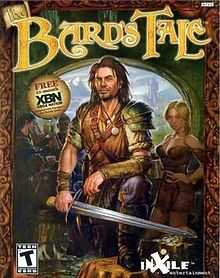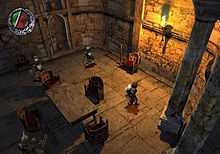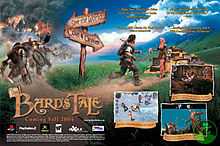The Bard's Tale (2004 video game)
| The Bard's Tale | |
|---|---|
 The Bard's Tale Xbox front cover | |
| Developer(s) | inXile Entertainment |
| Publisher(s) | Vivendi Universal Games |
| Designer(s) | Brian Fargo, Matthew Findley, Eric Flannum, Dennis Miller, John Parry |
| Composer(s) | Clint Bajakian, Michael Land, Peter McConnell, Jared Emerson-Johnson and Tommy Tallarico |
| Engine | Dark Alliance Engine |
| Platform(s) | |
| Release date(s) | PS2, Xbox
Windows
Steam
Apple iOS
BlackBerry PlayBook
OS X
Android
Linux
|
| Genre(s) | Action adventure |
| Mode(s) | Single-player |
| Distribution | Optical disc, online distribution, cloud computing |
The Bard's Tale is an action role-playing game created by inXile Entertainment, and published by Vivendi Universal Games in 2004. Vivendi marketed the game as a humorous spoof of fantasy role-playing video games. It is neither a remake nor a sequel to Interplay Productions' Tales of the Unknown, Volume I: The Bard's Tale (1985).
The Bard's Tale was released for the PlayStation 2 and Xbox in October 2004. It was released for Microsoft Windows on July 28, 2005. The game was re-released on Steam in December 2009. A universal iOS version was released in December 2011 for iPhone and iPad. Versions for Blackberry Playbook[1] and Android were released in September 2012.[2] In June 2013, the game was also ported to Ouya with full controller support.
Story
The plot involves "a sardonic and opportunistic musician and adventurer, driven by carnal rather than noble pursuits. The Bard, who is never identified by a specific name nor addressed by anything other than "The Bard," is not interested in saving the world; his humble motivations are strictly "coin and cleavage." His quest is narrated by a mocking, biased man (played by Tony Jay) who cannot stand him.

The Bard (voiced by Cary Elwes) ends up being recruited by a cult to help free a princess named Caleigh. As a result of this, the Bard finds himself being attacked by an assortment of fanatics from a Druid-like cult, sent to dispatch him by a being called Fionnaoch. (Many of the names and characters are influenced by Celtic mythology and the stories of the Orkney Islands.) On the way to complete his quest, the not so valiant anti-hero will have to overcome the truly terrifying challenges of three monstrous guardians, break-dancing corpses, spontaneously melodious goblins and a giant, and a fire-breathing rat.
Eventually, it is revealed that the Bard is just another in a long line of "Chosen Ones," many of whom he finds dead along his path. Caleigh is revealed to actually be a demon tempting people to come free her for years on the assumption that eventually someone would succeed. If the Bard frees Caleigh, she gives him all his heart's desires while destroying the world. If he slays Caleigh, The Bard returns to the road in search of the next bar maid. Alternatively, he can refuse to fight either the Druid Leader or Caleigh, allowing the undead to overrun the world, a situation he is content with as they make good bar buddies.
Gameplay

Completely unlike the classic Bard's Tale games, this game is in a 3D environment with the player watching his only controllable character from an overhead vantage point, and it is better described as an action-adventure game than a traditional role-playing video game (i.e. there are no character classes or inventory management).
The player's character, The Bard, has magic and weaponry at his disposal to complete the task. The more the player accomplishes, the better his skills will become. The appearance and gameplay is much the same as the Baldur's Gate: Dark Alliance series, which shares the same graphics engine.
The game uses a "snarky or nice" system of dialog that allows the player to change the outcome of many situations by deciding how they want to respond. Some choices, such as being snarky to the dog at the beginning of the game, have game-lasting consequences. The first decision is whether to be nice or snarky to the barmaid in The Drunken Rat. Being nice to her gives her the impression the Bard's a gentleman and she leaves him alone, being snarky ensures the Bard doesn't spend the night alone.
The game also contains several song numbers, including:
- Beer, Beer, Beer - sung by drunks in The Drunken Rat
- The Tale of the Nuckelavee - sung by a band of drunks in The Aiken Drum, lamenting the unleashing of the Nuckelavee (which, unbeknownst to the band, was set loose by The Bard)
- It's Bad Luck to Be You (The Chosen One) - a recurring song by the Trow Trio, with differing lyrics each time
Setting
Most of the names for places are actual locations in the Orkney Islands, including Kirkwall, Dounby, Finstown, Houton, and Stromness. Some optional areas are places in Ireland, including Dún Ailinne, Ardagh, Carrowmore, Emain Macha, and Tara.
Characters
The Bard
The otherwise nameless protagonist of the game, The Bard is a selfish rogue who will only undertake a quest if there is a likely profit in it for himself.
Summonable Allies
- Brute - throws boulders at enemies, momentarily stunning them
- Enchantress - can resurrect the Bard in the event that his Hit Points run out
- Knight - can use his shield to stun enemies and has high defense due to his armour
- Mercenary - swings haphazardly at enemies with an axe
- Rogue - draws foes to her then speeds behind them and stabs with daggers
- Crone - periodically restores the Hit Points of the Bard and his allies
- Heroine - shoots at enemies with a rapid-fire crossbow
- Knocker - electrocutes enemies with lightning rods
- Light Fairy - lights up dark areas, and can stun enemies in battle with flashes of light
- Explorer - can disable traps (at the cost of fewer Hit Points than if the Bard were to get caught in them). Can also pick up treasures and uncover secret passage ways
- Bodyguard - draws ranged attacks to himself
- Behemoth - charges into foes causing an explosive inferno
- Elemental - a burning creature that hurls fire balls at enemies and can be used to melt walls of ice
- Gouger - transfers the Hit Points of enemies to the Bard and his allies
- (Vorpal) Rat - a rat that can be used to scare women (and a Viking in Finstown) by doing so the bard can get a small bit of coin
- Thunder Spider - a small spider made of lightning, that discharges continuous streams of electricity into enemies stunning them
The Narrator
The ever-present commentator of the game, The Narrator provides sarcastic observations throughout the game, mostly about The Bard's self-interested character. The Bard frequently breaks the fourth wall by addressing the narrator directly.
Caleigh
A beautiful, rich princess who is being held captive by Fionnaoch. Caleigh is eventually in the last chapter found to be the queen of the underworld, apparently displaying a false image to the bard during previous contacts with him. In the end the bard gets to choose between becoming her betrothed and letting the world burn, killing her once and for all, or just leaving the tower with her and Fionnaoch just standing there.
Fionnaoch
A mysterious figure who commands great warriors and is holding Caleigh captive.
The Three Tower Bosses
Once defeated, the Tower Bosses become summonable allies.
Fictional creatures
- Kunal Trow: Humanoid, goblin-type people, who tend to be very aggressive in nature. Unlike goblins, they speak fluent English.
- Peerie Trow: The smaller, less violent version of the Trow, these creatures are more likely to use cunning to achieve their ends.
- Bugbear: The Bugbear is a creature that's been preying on the people of Houton.
- Zombies: Undead humans, cows, and chickens unleashed by the main villain.
- Finfolk: An aquatic creature that has fins, claws, sharp teeth, and tentacles.
- Firbolg: Firbolgs are large, gentle creatures who are natural miners.
Parody of fantasy games
There are many references and parodies to common clichés of the fantasy RPG genre. These include:
- The first quest involves slaying rats in the cellar of a tavern (a cliché of Baldur's Gate fame). However, in this parody, instead of defeating small, harmless rats, the vermin in question turns out to be a gargantuan, fire-breathing rodent.
- When The Bard kills his first wolf, it drops a pile of treasure, parodying a common video game cliché of wild animals inexplicably having money and items. After that, enemies only drop items they may logically, albeit not always trivially, have. For example, a dead wolf may leave its hide, but also a red hood or picnic basket. The dead Druids often drop snow globes depicting Houton or keepsakes from Stonehenge. Zombies often drop self-help books.
- Early in the game, fun is also poked at the common looting of homes in RPG games. When The Bard takes said treasure, the Narrator accuses him of stealing. The Bard's defense is that he's providing a public service and that the chests would be cluttered if he didn't clear them out.
- The player can have The Bard smash a barrel early in the game, which prompts the barrel-maker to come out and chastise him for smashing his barrels. He does offer a deal: smash all other barrels The Bard sees so that the barrel-maker can sell more barrels. This is a parody of the common practice in RPGs of the players breaking containers for their goods, commonly including keys.
Connection to 1980s series
Although touted in early promotional materials as a remake of the classic Bard's Tale series, InXile Entertainment never had any rights to the trademarks of the original Bard's Tale — those rights are still owned by Electronic Arts. This meant that InXile was not legally allowed to use any of the plot, characters or locations featured in the original trilogy.
However, allusions to the original Bard's Tale do exist in the game. The city in which Fionnaoch's tower stands, Dounby, is only a few kilometers away from the ruins of real-world Skara Brae, where the original trilogy takes place. The PC, Android, and iOS ports of The Bard's Tale comes packaged with the original Bard's Tale trilogy.
Reception
Reviews of the game were generally favorable, receiving a 75% average critic score on Metacritic.[3] IGN reported, "There is so much humor and such a great sense of wit, I highly recommend The Bard's Tale to anyone who has even the slightest sense of humor." The official Xbox Magazine said, "Though no aspect of it truly screams triple-A, the entire effort is one that patient players who can endure the early hours will surely enjoy." GameSpot gave the game a mediocre review, saying, "A decent dungeon crawler that invests some energy into lampooning RPGs and high fantasy in general, but like a stand-up act about airline food or the line at the post office, its perspective isn't very interesting, and it lacks any real follow-through."
References
External links
- Official website
- Official InXile Bard's Tale website @ Ubisoft
- Bard's Tale at MobyGames
- IGN: The Bard's Tale (PS2) Xbox
- The Adventurers' Guild (Ultimate Bard's Tale Resource)
| ||||||||||||||